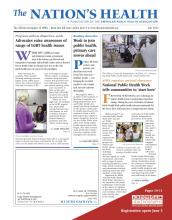When it comes to distracted driving, even parents with young children in the car are no exception to using a cellphone, a recent study shows.
Ninety percent of parents in a University of Michigan survey said they engaged in at least one distraction while driving in the past month, such as feeding a child or changing a CD, according to a study in the May-June issue of Academic Pediatrics.
The study surveyed 570 drivers between October 2011 and May 2012 who brought in children ages 1-12 for emergency care at the University of Michigan C.S. Mott Children’s Hospital emergency department in Ann Arbor, Mich., and the Hurley Medical Center in Flint, Mich.
“I had this expectation that parents might do a little bit better in terms of distractions when their kids were in the car and they might think twice about picking up the cellphone,” said lead study author Michelle Macy, MD, MS, an emergency medicine physician at C.S. Mott Children’s Hospital. “But our numbers show that parents are using cellphones behind the wheel when their kids are in the car as much as our national numbers would suggest it’s going on.”
Nationally, about 421,000 people were injured in motor vehicle crashes that involved a distracted driver in 2012, according to the National Highway Traffic Safety Administration — an increase from 387,000 in 2011. In addition, 169,000 children ages 14 and under were injured as the result of a motor vehicle crash in 2012, according to NHTSA.
The study asked parent drivers how often in the past month they engaged in 10 distractions across four categories: non-driving related, cellphone-related, child-related and directions-related. The study also asked about other measures of driving safety, such as seat belt use, drowsy driving or ever being pulled over for speeding.
Twenty percent of parents admitted driving while drowsy in the past year and 5.3 percent admitted to driving while impaired, according to the study. Half of the parents admitted to ever being pulled over for speeding, the study said. Additionally, white parents were more likely than black parents to report being distracted by directions or cellphone use, the study said. That finding may be linked to having a higher socioeconomic status, which may allow better access to technology used while driving, study authors said.
While distracted driving is often couched as an issue for teens or young adults, the study shows the issue is a problem for other Americans as well.
As such, the public health community should spread awareness of distracted driving as a problem for all drivers, Macy said. While states and municipalities have passed legislation on behaviors such as text messaging, Macy said she knows there are other things that distract parents that are harder to legislate, such as child feeding.
Macy said she is concerned that parents may not be setting good examples of safe driving for their children to emulate when they learn how to drive as young adults.
“I think as kids growing up in a car where doing five things while you’re driving is the norm, they’re going to expect to be able do that as they’re learning (to drive),” Macy told The Nation’s Health. “Role modeling is the greatest concern for me in terms of the downstream effects for this.”
For more information, visit www.academicpedsjnl.net/article/S1876-2859%2814%2900077-1/abstract.
- Copyright The Nation’s Health, American Public Health Association









